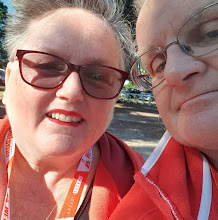FF@Five'o'clock'ish,7th September 2018
Welcome!
This week I am bringing to you something a little
different.
Have you ever wondered how colour trends are
created? Do you ever wonder how some people can pull colours together and
seem to make them work, though they may not have been colours you may
have thought of? Well let’s take a little dip into the world of colour.
I love colour and my heart goes out to many in this world who can’t see it for
whatever reason, not just blindness.
In the world of colour there is the PANTONE
MATCHING SYSTEM®. You may or may not have heard of Pantone,
not to be confused with ‘pantene’ the hair products. I’ve known about
Pantone most of my adult/working life. I have worked in publishing,
printing and media places where sometimes you have to get the right colour
‘coding/numbers’ eg hex codes so that shades can be mass produced, paint
colours mixed, ink batches to be consistent. And yes even colours on a
webpage to be consistent. Ever wonder where most modern colour matching/coding
comes from? Yep, Pantone©, you got it!
I’ve been subscribed to Pantone’s newsletter
for quite a few years. Here is an excerpt from Pantone’s website about them and
what they do and how the world uses their powerful colouring ‘tools’
NOTE: this is a quote, I did not write this,
I do not claim ownership of this quote...
About Pantone Standards
In 1963, Pantone revolutionized the printing
industry with the colorful PANTONE MATCHING SYSTEM®, an innovative
tool allowing for the faithful selection, articulation and reproduction of
consistent, accurate color anywhere in the world. The tool organizes color standards
through a proprietary numbering system and chip format, which have since become
iconic to the Pantone brand.
Pantone’s color language supports all color
conscious industries; textiles, apparel, beauty, interiors, architectural and
industrial design, encompassing over 10,000 color standards across multiple
materials including printing, textiles, plastics, pigments, and coatings.
Pantone Standards are available both
digitally and physically. Integrated workflow tools such as PantoneLIVE and Pantone Studio, ensure market-relevancy
and color achievability as technology continues to transform the design
process.
So why am I writing about this today?
In my Pantone newsletter overnight, this is one of the photos that stood out to
me, it made me go wow! I go wow a lot but a light bulb went off and I
just had to write about it.

Stampin’ Up! is so on the ball and I know
from conversations I’ve been privy to in the presence of Sara Douglass, SU’s
CEO, that they work way way in advance to bring you what is going to be on
trend and current. Most of the time 2 years ahead, I kid you not!
When this year’s latest ‘in colours’ came out
in the current annual catalogue, the 5 in colours really stood out to me more
so this year than many others. It goes back to when I worked in
publishing. To when I helped my son through his uni degree in graphic
designing. I thought of the Mondrian style of colour blocking, all things we
learned together and things I learned through my working life (oh and as well
as art history in high school). Recognise this colour blocking in the photo
below? Yes, that is Piet Mondrian, a Dutch artist who was very
influential in 20th century modern art.

If you are around my age give or take 10
years older or younger, you may remember a certain brand of hair spray that
used this colour blocking on their white tins. I loved it during the ‘big
hair’ days LOL.
So what I’m trying to get at with today’s
post is this. If you feel matching colours is beyond you, if you feel
that you could never get the results some artists get because you get
overwhelmed with trying to match things, let Stampin Up’s colour suites help you. Let
Pantone© help you. Use what you see around you in design and media, shop
front window displays, doona cover designs, what ever. Let it speak to
you and think yeah, I CAN do that!
soooo, til next time,
Happy stamping, colouring & creating!













































